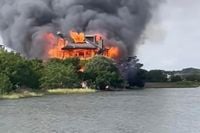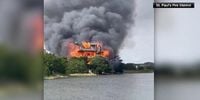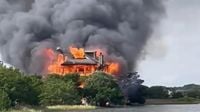The tranquil shores of Edisto Beach, South Carolina, were shattered on the morning of October 4, 2025, when a devastating fire engulfed the waterfront home of Circuit Court Judge Diane Goodstein. The blaze, which erupted around 11:30 a.m. in the exclusive Jeremy Cay gated community, left the judge’s million-dollar residence reduced to ashes, sent three members of her family—including her husband, former state senator Arnold Goodstein—to the hospital, and ignited a swirl of speculation and concern across the state and beyond.
According to Bloomberg Law and FOX News, Judge Goodstein, 69, was out walking her dogs when the fire broke out. The timing was grimly fortuitous for her, but her husband, Arnold Goodstein, 81, their son, and a grandson were inside. As the flames rapidly consumed the home, Arnold and the others were forced to escape by leaping from upper-story windows. Emergency responders, battling difficult terrain and the rising tide of panic, used kayaks and canoes to reach the stranded family members, who had sought refuge in the marshland behind the house. Arnold Goodstein suffered broken legs from the fall and was airlifted to the hospital; the son and grandson were also hospitalized for injuries. Tragically, the family’s pets did not survive the inferno, as noted by Rep. Nancy Mace (R-S.C.) on social media.
The property, a four-bedroom, four-bathroom home valued at $1.55 million, was a local landmark. But in the wake of the fire, it became a flashpoint for questions of public safety, political tension, and the personal toll of public service. The St. Paul Fire District and Edisto Beach Fire Department, who responded to the scene, posted dramatic images of the blaze and the rescue efforts, as reported by FOX News and The Post and Courier. Neighbors even joined the rescue, helping paramedics navigate the marsh with a canoe and rope to bring Arnold and others to safety.
As the smoke cleared, attention turned to the cause of the fire. Early rumors, fueled by comments from South Carolina Supreme Court Chief Justice John Kittredge and reported by FITSNews, suggested an “apparent explosion” might have triggered the blaze. Social media erupted with speculation—some, like Rep. Daniel Goldman (D-N.Y.), openly questioned whether the fire was an act of arson linked to Judge Goodstein’s recent high-profile ruling against the Trump administration in a contentious voter registration data case. Goldman wrote, “Today, someone committed arson on the Judge’s home, severely injuring her husband and son. Will Trump speak out against the extreme right that did this?”
But law enforcement officials quickly moved to tamp down these suspicions. Mark Keel, chief of the South Carolina State Law Enforcement Division (SLED), stated unequivocally on October 6, “At this time, there is no evidence to indicate the fire was intentionally set. SLED agents have preliminarily found there is no evidence to support a pre-fire explosion.” Keel urged the public, “I urge our citizens, elected officials and members of the press to exercise good judgment and not share information that has not been verified.”
Despite these reassurances, the investigation remains ongoing. Investigators are still sifting through the charred remains for clues, with Keel promising a follow-up statement once the full inquiry concludes. The U.S. Fire Administration, which falls under FEMA, notes that most house fires are accidental, often caused by cooking mishaps, electrical faults, or careless behavior. Still, with the timing of the fire—coming just weeks after Judge Goodstein’s controversial ruling and a string of death threats against her—many in the community remain uneasy, waiting for definitive answers.
The political backdrop to the tragedy is hard to ignore. In September 2025, Judge Goodstein issued a temporary injunction blocking South Carolina from releasing the personal data of more than 3.3 million voters to the Trump administration’s Justice Department. The administration, seeking to compare this information with federal databases to root out alleged illegal voting by non-citizens, faced a legal roadblock in Goodstein’s ruling. Her decision was publicly criticized by Assistant Attorney General for Civil Rights Harmeet Dhillon, who called it a “hasty nullification of our federal voting laws,” as reported by The Guardian. South Carolina’s Republican Governor Henry McMaster also opposed the ruling, filing an emergency petition to overturn it. The South Carolina Supreme Court sided with McMaster on September 11, overturning Goodstein’s injunction in a six-page opinion that questioned the basis for her decision.
Following her ruling, Judge Goodstein reportedly received multiple death threats, a fact cited by several news outlets including FITSNews and The Guardian. While SLED has not confirmed any direct link between these threats and the fire, the climate of hostility toward judges in politically charged cases has been a growing concern nationwide. As Above the Law noted, “Even without knowing the ultimate cause, having your house go up in flames is a jarring thing to live through. Wishing the best to Judge Goodstein and her family as they wait for more information on what happened.”
Meanwhile, the Goodstein family faces a long road to recovery. Arnold Goodstein, a Vietnam War hero and former state lawmaker who served in the South Carolina House of Representatives and Senate during the 1960s and 1970s, is reportedly still hospitalized with serious injuries. The family’s ordeal has drawn sympathy from across the political spectrum, with many expressing hope for their swift recovery and for a thorough, transparent investigation into the fire’s cause.
As the probe continues, the incident has also reignited debate over the safety of public officials and the boundaries of political discourse. The episode has underscored the very real risks faced by judges and their families, especially in an era of heightened polarization and online vitriol. Chief Mark Keel’s call for “good judgment” and restraint in sharing unverified information serves as a reminder of the dangers of speculation—a lesson that resonates far beyond the gates of Jeremy Cay.
For now, Edisto Beach remains on edge, waiting for clarity. The charred remains of the Goodstein home stand as a stark symbol of vulnerability, resilience, and the high stakes of public service in contemporary America. As authorities continue their work, the community—and the nation—watches, hoping for answers and healing in the wake of tragedy.



